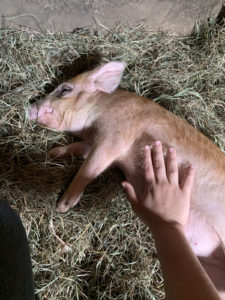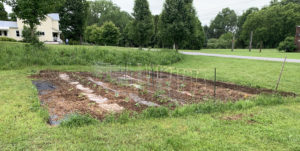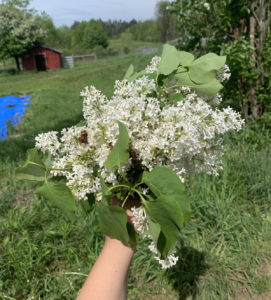By: Elora Bevacqua, Swette Center student worker.
World Wide Opportunities on Organic Farms is an organization like no other that provides anyone the opportunity to travel and work on farms around the world. The process starts with registering as a WWOOFer on their website and finding a host. When I decided to pursue this opportunity, I wanted to stay in the United States as a “test run” before committing to an abroad experience. After scrolling through the list of hosts located all over the country, I sent messages to many in various northeastern states. Wainscott Farm in upstate New York was the first to respond and Lisa, my future host, accepted my request!
The middle of May quickly rolled around and I excitedly flew to my destination. Lisa and her family welcomed me with open arms starting my month-long stay off on a good foot. I got acquainted with Wainscott Farm the next few days as I toured the place. Chickens, cows, goats, and a multitude of wildlife make their home there. There was abundant wildlife in the 50 acres of woods that extended out back. I also received a tour of the small rural town of Mexico where the farm is located.
As far as farming goes, the first task I undertook was thinning out a row of rhubarb. This process required removing all the small stocks from the plants. Doing this allowed the stocks that remained to grow big and juicy. Later in my stay, we harvested rhubarb and made some yummy cake, compote, and crumble. Another first adventure involved the beautiful purple and white lilacs that were blooming when I first arrived. We pruned the bushes and collected a fragrant bouquet from the clippings.
At the end of the first week began one of my favorite parts of this trip. Lisa, her son, and I took an hour's drive up to Watertown and we got baby pigs! Only a few weeks old, they were named Rose and Albus after Harry Potter characters by the avid fan, Lisa’s son. Unfortunately, a week later Albus had breathing problems, so the seller exchanged him for another pig in order to keep an eye on him. The first day this new piglet arrived (named Claire), she escaped! I chased after her for what seemed like an eternity and after a few failed attempts, I was able to catch her. During my stay, I often sat with the piglets because this helps them become comfortable around humans. They are very intelligent creatures and much cleaner than they are given credit for. Both the babies loved getting belly rubs. After rubbing behind their ears, they would sit down and eventually flop over to get their tummies rubbed. Lisa and her family are passionate advocates for sustainably raised meat which they make a priority on their own farm. Although these pigs will be slaughtered once they have reached maturity, they will have had happy lives in the sunshine with a clean pen and lots of treats!
A big mission we undertook was prepping and planting the raised bed and the veggie patch. The raised bed was set up by the house, filled with compost, and planted with peas, carrots, lettuce, radishes, beets, basil, and tomatoes. The veggie patch required a bit more work; we had to weed, till, and lay out weed cloth to form the rows. While I was weeding it, I found snails and slugs which I collected to feed to the chickens. Once the patch was prepared, Lisa and I put in plants that were grown by family friends and the local nursery. These included tomatoes, peppers, marigolds, and a few squash varieties. We also formed a few mounds out of porcupine poop to test the Native American three sisters' method by planting corn, beans, and squash. To start this, we planted corn, and eventually, when it has grown six inches, the beans and squash will be planted to form a mutualistic relationship between all three plants. Nothing was able to be harvested while I was there (besides the already growing rhubarb and some wild strawberries), but Lisa currently sends me updates and she is expecting a big harvest in the fall.
An interesting dilemma that is commonly encountered at the Wainscott Farm is pest management. Spongy months eat the apple tree leaves. Japanese beetles, a rust fungus, and wild birds terrorize the berry patches. Slugs and groundhogs come for the veggie patch. Carpenter bees form holes in the wood of the barn. My host preferred to tackle all of these problems with organic and sustainable methods which means that during my stay we commonly had tasks around these issues. For the spongy moths on the apple trees, we picked them off by hand and then sprayed an organic deterrent on all of the leaves. Similarly, we put an organic spray all over the berry patch. Additionally, for the berries, we tied up Christmas ornaments, beach balls, and reflective tape to scare off birds. To handle the carpenter bees, we hung up a trap and put toothpaste in all of the holes. The toothpaste solution was an especially fun experience because we had the help of many local kids. Lisa was still brainstorming ideas for how to deal with the groundhogs when I left. Overall, it is a lot of work to sustainably tackle these pests, it is critical to maintain a healthy ecosystem on their farm.
I went on a variety of other adventures during my stay including shadowing a beekeeper, sightseeing different places in upstate New York, attempting to learn the German language, exploring the woods, hanging out with more kids than I ever had before, cooking new things, and being grateful that I could spend almost every day outside in the beautiful weather. In mid-June, I headed back to Arizona. Wainscott Farm was a wonderful place to stay for a month and I took away many valuable lessons. Lisa had a wealth of knowledge to share related to my academic studies in sustainability. She is inspiring to me as she represents how we all should be living sustainably with solar energy, rainwater collection, and eating organic. I am grateful for my time as a WWOOFer here and I look forward to future endeavors in the same vein.






